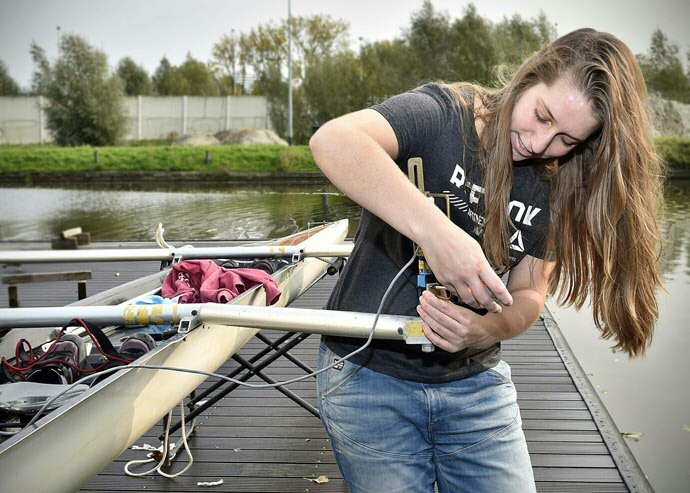Beurtelings roeien kan leiden tot snellere races

Iedere roeiboot heeft tijdens een race wisselingen in snelheid. Dit omdat tussen twee roeislagen door de snelheid van de boot nogal terugloopt. Deze snelheidsverschillen zijn terug te brengen door roeiers om de beurt een slag te laten maken in plaats van alle slagen synchroon uit te voeren. Dit kan mogelijk leiden tot snellere eindtijden bij een race, aangezien roeien het meest efficiënt is op een zo constant mogelijke snelheid. Dit blijkt uit een proefschrift van bewegingswetenschapper Laura Cuijpers van het UMCG. Uit Cuijpers’ onderzoek blijkt dat roeiploegen in staat zijn om op deze manier te roeien en dat het leidt tot minder snelheidsverschillen van de boot. De resultaten van haar onderzoek vormen een veelbelovende indicatie dat deze manier van roeien teams voordelen kan bieden. Zij promoveerde op 9 september aan de Rijksuniversiteit Groningen.
Roeien is een geweldig voorbeeld van teamwork, synchronisatieprocessen en samenwerking. Het is indrukwekkend om te zien hoe bijvoorbeeld de Achten, op het maximum van hun kunnen presterend, in perfecte synchronisatie als één bewegen. Als toeschouwer zie je één ploeg, één boot, in plaats van acht individuele roeiers. Normaliter streven roeiers naar perfecte synchronisatie. In theorie zijn via antifase-roeien, waarbij roeiers beurtelings een slag maken, snellere tijden te realiseren. Dit doordat de snelheid van de boot tussen twee slagen in, minder fluctueert en terugloopt.
Onderzoek roeipatroon
In haar onderzoek ging Laura Cuijpers na of dit inderdaad zo is en of roeiteams dit in de praktijk ook kunnen. Zij deed haar onderzoek zowel in het lab als op het water. In het lab gebruikte zij ergometers die met elkaar verbonden waren via slides om de bewegingen van één ‘boot’ ten opzichte van het water na te bootsen; op het water volgde zij de roeiboten met een zelfgemaakt meetsysteem.
Roeiteams kunnen beurteling slag maken
In haar onderzoek laat Cuijpers zien dat roeiers goed in staat zijn om in een antifase-patroon te roeien, zelfs wanneer ze dit voor de eerste keer proberen; wel voerden de roeiteams het antifase-patroon minder stabiel uit dan het voor hen normale en goed getrainde in fase-patroon. De roeiteams konden beide manieren van roeien stabieler uitvoeren in een hogere slagfrequentie dan in lagere slagfrequenties; vooral omdat in wedstrijden met de hoogste slagfrequentie wordt geroeid, is dit een belangrijk gegeven.
De klapschaats van het roeien?
Cuijpers toont aan dat het roeien in antifase inderdaad leidt tot minder snelheidsfluctuaties van de boot. Tot snellere tijden leidde het overigens nog niet; een WK-boot was bij hun eerste keer in antifase roeien slechts 4 seconden langzamer dan in het door-en-door getrainde synchroon roeien. Volgens Cuijpers laten de resultaten van haar onderzoek een veelbelovende eerste indicatie zien van de potentiële voordelen van het roeien in antifase. ‘Misschien is dit de klapschaats van het roeien’. Zij pleit dan ook voor meer studies naar de voordelen van het roeien in antifase. Cuijpers: ‘Dit staat eigenlijk los van de vraag of roeien op deze manier uiteindelijk sneller blijkt te zijn. Roeien is een prachtige sport om menselijke samenwerking te bestuderen. Samenwerking in synchronie of op een manier waarop de individuen van een team elkaar aanvullen, zoals in antifase’.
Curriculum vitae
Laura Cuijpers (1991, Dordrecht) studeerde Bewegingswetenschappen aan de Rijksuniversiteit Groningen, mede geïnspireerd door haar ervaringen als wedstrijdroeier. Zij was jarenlang wedstrijdroeier. De titel van haar proefschrift is: ‘Coordination dynamics in crew rowing’. Zij blijft na haar promotie als docent/onderzoeker werken bij bewegingswetenschappen in het UMCG.
Meer informatie
Meer nieuws
-
17 november 2025
Kunstmatige intelligentie in de zorg
-
04 november 2025
AI-Fabriek in Groningen zorgt voor digitale soevereiniteit
-
03 november 2025
Menopauze in perspectief: Hoe de media onze beleving beïnvloeden
